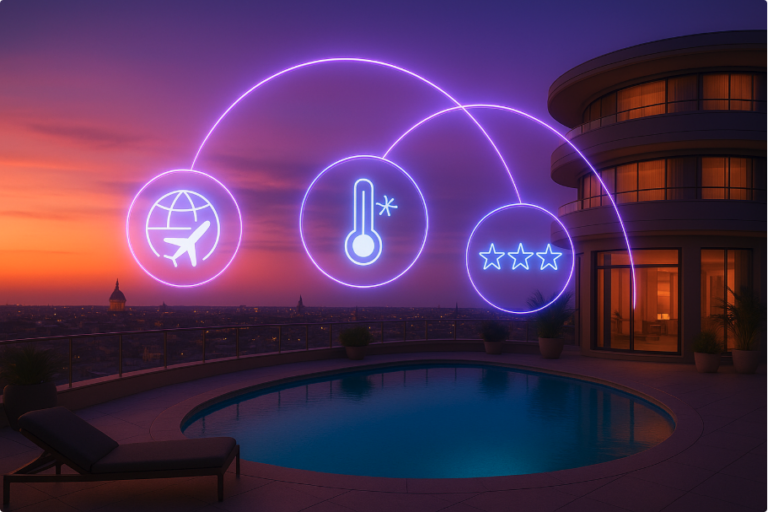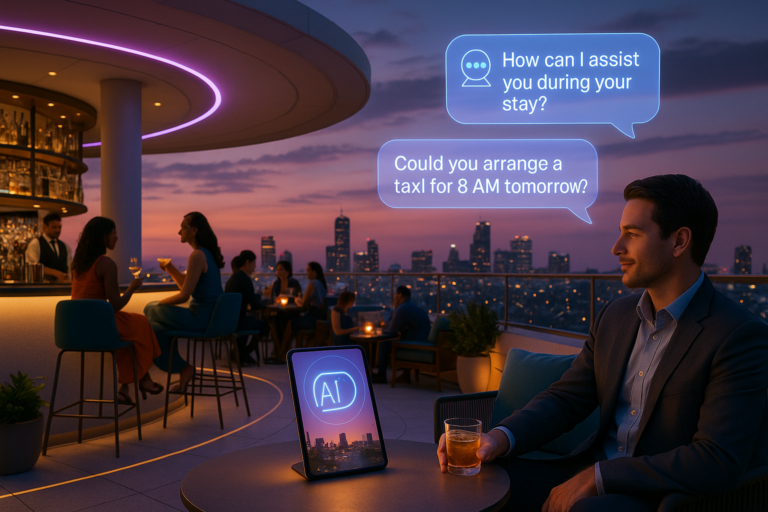We’re quickly approaching the official wrap-up of 2019 and it’s been another exciting year in travel and hospitality. We are now one step closer to the future and those innovative technologies that we envisioned ever since The Jetsons aired on TV.
Every year, we make it our mission to break down the most impactful and exciting technology trends that are rumored to steal the spotlight in the year to come. You can check out the previous versions, for 2018 and 2019, to see what the hype was all about back then.
Now let’s get down to business and explore the 2020 travel tech trends and see what the future has in store for the hospitality industry!
Facial Recognition
In recent years, your face has become the key to unlock your phone, to be used as your banking password, and also to confirm your identity alongside images of your ID card. Building off this, there is an upcoming trend of facial recognition being applied in some airports around the globe. Could this fix those inconvenience hours spent in line at multiple security checks? It is predicted that soon, the majority of travelers will be able to use their own faces as ID cards and fast-forward through the airport security without even having to worry about taking out their ID, passport, or driver’s license. We are headed towards a future focused on immediacy, automation, and on-the-spot solutions that are meant to make the travel experience easier and more stress-free than ever. While there are definitely pros and cons to facial recognition, it’s undoubtedly fascinating to witness the tech concepts that are paving the future of travel. In Singapore, for example, it was recently announced that, come 2025, all travelers will get to access a fully automated immigration system involving facial and iris scans.
Self Check-In
While on the topic of immediacy and fast solutions, let’s explore another tech trend that is very likely to impact 2020, this time in terms of both airport check-ins (luggage) and hotel check-ins. We are aware that different generations of travelers have different preferences and expectations from a hotel and a “one-size-fits-all” approach no longer cuts it. This applies especially to the hotel check-in process, where some guests like to be greeted and guided by actual hotel staff, while others would like to speed things up and do the check-in themselves. For hoteliers, a check-in kiosk is known to reduce costs and automate processes while enabling guests to make their own choices and save time. Self-service can also translate to more upsell opportunities since it can easily display extra services and enable guests to choose the ones that fit their needs. If you’re not quite convinced, here are 5 good reasons why your hotel should have self-check-in.
Smart Integrations & Personalization
By now, daily operations have grown tricky for businesses that don’t rely on interconnected software. While it’s important to focus on each independent system and its stand-alone features, it is equally important to check its integration capabilities. In this modern age, hospitality businesses have to think of their must-have technologies as pieces of the same puzzle – in order to get the perfect outcome, all of them need to integrate seamlessly with each other. The importance of smart integrations is something that we have previously emphasized and we can now say with confidence that this is more than a trend – it’s a necessity of the 21st century. Besides making operations easier, faster, and more efficient, integrations also contribute to the personalization of the guest experience. For example, when a hotel PMS system is interlinked to the feedback management platform, valuable insights about the guest’s expectations and experience (from a pre-stay survey or a previous hotel-guest communication) can be automatically transferred and stored in the PMS. This results in a richer and more insightful guest profile, which enables hoteliers to know more about their guests, ensure that they meet their expectations, and provide an excellent hotel stay.
VR / AR / AI – all the abbreviations
Nothing completely new here, but these are some tech innovations that have been impacting the hospitality sector for a while and will certainly continue to do so. The hype might have cooled down, but the innovations are getting better and more impactful every day. Chatbots and artificial intelligence are now used globally for a multitude of purposes, especially for optimizing hotel-guest communications. They are being perfected to replicate human behavior and they are known to be both time and cost-effective. Hospitality is the perfect environment for virtual and augmented reality since they allow the visual exploration of travel destinations, accommodations, and settings. VR and AR are in no way mandatory for hotels and it doesn’t seem like they will be anytime soon, but they’re excellent examples of features that can spice up a guest’s journey and drive a higher level of popularity for a hotel, which can result in more bookings. Every year we evolve more on the tech front and these exciting innovations can definitely enhance the quality of a guest’s journey, so it is likely that their popularity will not bulge, but instead increase in time.
Blockchain
At first sight, the word “blockchain” can sound slightly confusing, a bit too “techy”, and somewhat futuristic. However, this is a real concept that is already making waves in hospitality and travel and it seems like 2020 will have its fair share of it. Blockchain is basically a list of public records where different transactions between parties are stored in a secure way, through cryptography. For the travel sector, this works as a safe way of conducting operations and transactions, especially when it comes to payments. Blockchain technology has a decentralized nature, which means that the data stored is more secure, transparent, and permanent. Information cannot be lost or altered without consent from all the implicated parties. In the era of cybersecurity and unfortunately, online theft, blockchain is the type of technology that can ensure secure, stable, and safe operations, that simplify the travel experience and take a whole lot of stress out of the equation. If you’re looking to find out more about the ways in which blockchain can be applied in hospitality, here’s a great article on this topic.


